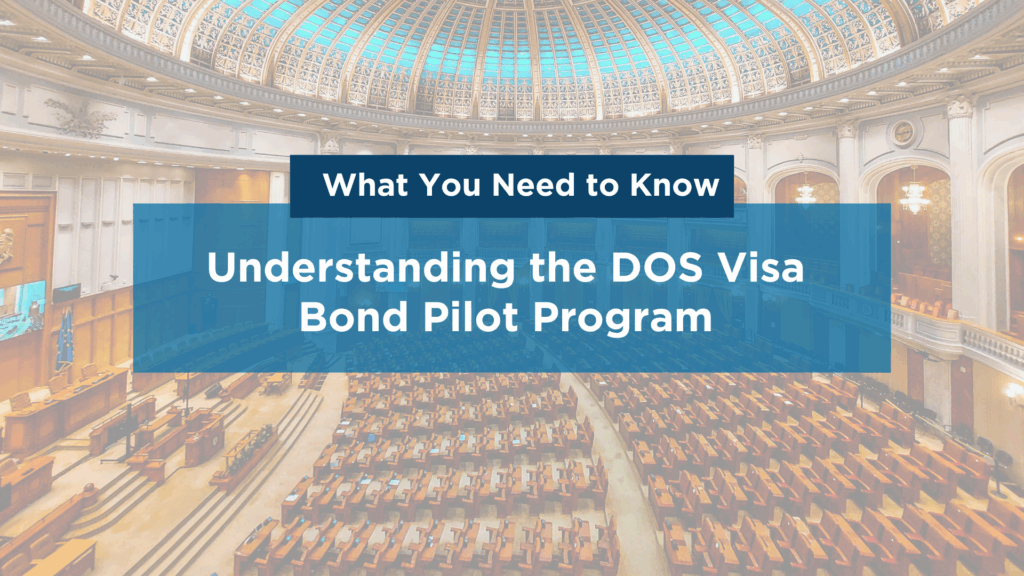
Effective August 20, 2025, through August 5, 2026, the U.S. Department of State (DOS) is rolling out a Temporary Final Rule (TFR) that could impact certain B-1 (business) and B-2 (tourism) visa applicants. Commonly known as the Visa Bond Pilot Program, this measure is designed to address concerns over visa overstays and to enhance vetting of travelers from specific countries.
As an Immigration Attorney in New Jersey, we are closely following this policy shift because it could affect both individual travelers and businesses that depend on international visitors or partners.
What is the Visa Bond Pilot Program?
This program gives U.S. consular officers the authority to require certain visa applicants to post a refundable bond—up to $15,000— before they can be granted a temporary visitor visa.
The policy applies to nationals from countries that meet one or more of these conditions:
- High Visa Overstay Rates – Countries with a track record of travelers staying in the U.S. beyond their visa expiration.
- Deficient Screening and Vetting – Where the U.S. has concerns about the country’s ability to provide adequate security and background checks.
- Citizenship-by-Investment with No Residency Requirement – Where individuals can obtain citizenship without ever living in the country.
Countries Currently Affected
As of the latest DOS update on August 5, 2025, the following countries are included:
- Malawi
- Zambia
This list is subject to change, depending on updated overstay data and security assessments.
How the Bond Works
- Amount: Up to $15,000, set by the consular officer based on risk factors.
- Refund: The bond is refundable if the visa holder complies with all U.S. immigration terms and departs before their authorized stay ends.
- Non-Refund: Failure to leave on time or comply with conditions could result in bond forfeiture.
Who Could Be Impacted?
For Businesses
- Tech Companies: If you’re inviting overseas talent or partners from an affected country, you may need to factor in the additional cost and complexity of a visa bond.
- Healthcare Facilities: Hospitals recruiting specialists or training doctors from impacted nations could face delays or higher entry costs.
- Manufacturers & Investors: Executives or investors visiting U.S. operations may have to post significant funds before travel.
For Individual Travelers
- Family visits, tourism, or business meetings could become more expensive and time-consuming.
- Even with proper documentation, the final decision and bond requirement rest with the consular officer.
Important Dates
- Effective Start: August 20, 2025
- End of Pilot Program: August 5, 2026
- Recent Correction: On August 11, 2025, DOS clarified dates and made technical corrections to the rule text.
Our Take as Immigration Attorneys
While the Visa Bond Pilot Program is limited in scope, it represents a broader trend toward tighter U.S. visa scrutiny. For businesses in New Jersey and across the USA, especially in industries dependent on global talent or international collaboration, this could introduce additional hurdles.
An experienced US Attorney or Visa Attorney in USA can:
- Help determine if your visitor is subject to the bond.
- Guide you through consular processing and ensure bond compliance.
- Prepare supporting evidence to minimize delays or additional requirements.
Key Tips for Employers and Travelers
- Plan Ahead – If your visitor is from an affected country, start the visa process well in advance.
- Budget for the Bond – Consider the possibility of an additional $15,000 temporary expense.
- Maintain Strong Documentation – Proof of ties to the home country, return plans, and legitimate business or tourism purposes can help reduce scrutiny.
- Work with an Immigration Attorney – Professional guidance can help avoid costly mistakes and ensure bond refunds.
Final Thoughts
This pilot program may only directly affect a small group of travelers right now, but its implications could expand. For New Jersey businesses, whether in tech, healthcare, or manufacturing, staying proactive is key.
Our role as your Immigration Attorney in New Jersey is to make sure visa processing—bond or no bond—doesn’t slow your growth, your projects, or your people.
📞 Contact our office today to navigate the Visa Bond Pilot Program and secure smooth U.S. entry for your business partners, employees, or family.